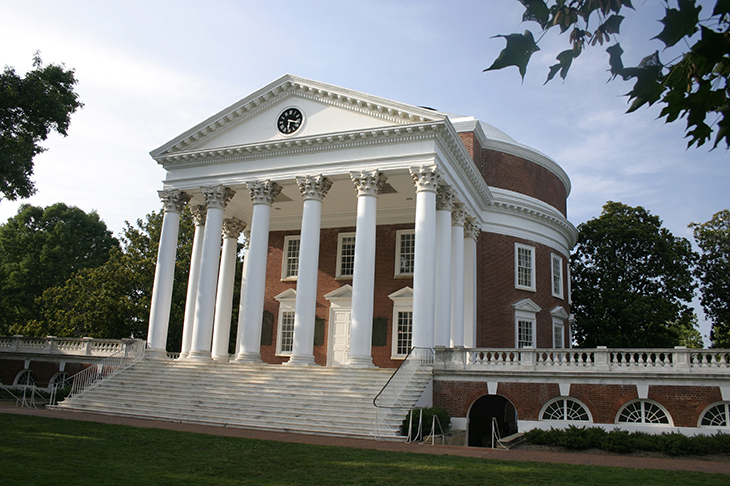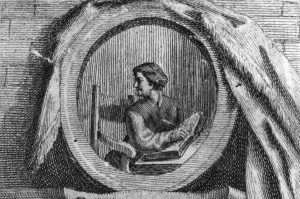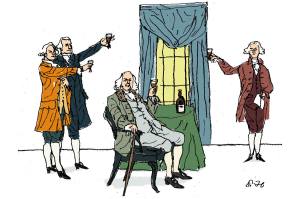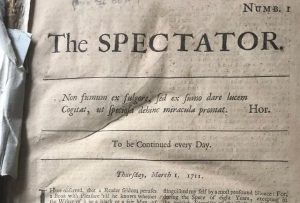Charlottesville is an enchanting Virginia college town graced by the neoclassical architecture of the university’s founder, Thomas Jefferson. I flew there with two friends, the talented photographer Jonathan Becker and the Vietnam Special Forces Silver Star winner Chuck Pfeifer, all of us close buddies of the deceased. It was the memorial service for Willy von Raab, scourge of drug dealers and illegal immigrants while commissioner of customs for eight years under Reagan. The humorist P.J. O’Rourke and I were the two speakers, and after a rousing ‘America the Beautiful’ we retired for an afternoon of southern hospitality and University of Virginia co-ed watching.
This is not woke, I know, but neither are heterosexuality, beauty or grace — or Christianity, for that matter. Charlottesville brought back memories of careless sunlit days lounging around the frat house drinking mint juleps and writing love letters to Sweet Briar girls: Mary Blair Scott, Ellen Hurst, Natalie Farrar, three beguiling sultry southern belles, now in their late seventies or even early eighties. Believe you me, as they say in the Bronx, jejune Oxford evenings à la Sebastian Flyte had nothing on us — zero, zilch.
The rituals of spring are ever present in Virginia: the cherry blossoms and the magnolias, the pretty girls in their shorts on Fraternity Row, the famous serpentine walls and the imposing Rotunda of Mr Jefferson keeping one’s mind off the horrors and ugliness of big American cities. If only we could go back in time. That’s an old lament of mostly old people. But sitting in the cafés you sat in 60 years ago does concentrate the mind on how lovely youth once was.
How confident we were that life would be a fantastic adventure shared with a myriad of beauties. The honor system that was observed strictly by everyone on and off campus made it easy to be a young adult. There were no scams or hoaxes, no phony accusations of rape or vile language, none of what makes students today so exasperatingly limp, woke and looking to take offense. No one talked about identity or empowerment; only freaks swore. Wearing a coat and tie was not mandatory but everyone did so. The only one in my class who did not was George Finn, excused by his peers because he had fought in Korea.
What I remember distinctly was that our ways were not the only right ones. We did not insist that all others were wrong. We did not seek to impose a single standard, and we did not become extremely upset when others seemed not even to recognize those truths that we held to be self-evident. I suppose that was because of the honor code we so believed in and adhered to. One did not lie about one’s perceived enemies or make up stories.
The University of Virginia, some of you may recall, was the location of a piece, written by a female journalist by the name of Sabrina Rubin Erdely, that alleged a gang rape by UVA’s Phi Kappa Psi fraternity (one, incidentally, that I was invited to join, though I declined). The story turned out to be untrue. Rolling Stone ran the false item on its cover and repented later — after it had collected from the higher sales the article had generated.
Which is par for the course. Intolerance is now the norm, and there are none more intolerant than those on the left. In order to provoke, I stopped our driver in front of a large house proudly flying the Confederate flag and admired it. Everyone was very polite. That’s Virginia for you. One of the many wrongs brought about by PC is the adoption of ghetto language and manners by people who have never been near a ghetto or a project. We can thank Hollywood and television for violence and the F-word now being the norm.
A pretty female student served us drinks in an outdoor café facing the campus and I asked her if we needed to show her our draft cards. She looked confused. We used to have to register for the draft at 18, I explained to her, so we had phony ones in order to be able to drink legally. She thought that very quaint and she found us quaint too, if a bit unconventional and strange.
After that it was mostly downhill. A little jolt of pleasure came from seeing a large oak tree planted by Thomas Jefferson still standing and in perfect form, but even that reminded me of a very drunken picnic long ago under its branches. Mind you, the nicest part of the trip were the people we celebrated Willy’s life with, all of them Americans, mostly southerners, with wonderful manners and dressed for the occasion. The brother of the head of my fraternity told a story about how I had approached his brother and announced that I had broken the honor code and needed to leave the university at once. I then apparently declared that I had lied about true love to various girls at Sweet Briar. The head would not hear of it. He correctly guessed that I needed to go to Palm Beach. ‘Did you mean it when you said it to them?’ he asked. ‘Yes, definitely. I meant it every time,’ I answered. ‘Well, then it’s OK. You’re excused, and you’re staying put.’
Too much honesty can cramp one’s style, n’est ce-pas?
This article was originally published in The Spectator magazine.


















